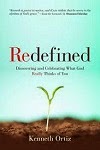The
divine redefinition, Ortiz says, changes everything. It changes our
access to God and how he relates to us. But many believers do not
understand and embrace their new definition. They have bad thinking.
Ortiz
has written this book to help us be aware of our beliefs about
ourselves, about God, and about how God relates to us. He helps us
understand imputed righteousness, our status as a child of God, that
it is by belief and not behavior (although belief determines
behavior), the scandal of grace and freedom in Christ, being a member
of God's family, justification by faith alone, and our rights to
certain promises and provisions guaranteed in the Word.
I
feel there needs to be a word of caution. Ortiz heavily emphasizes
our identity in Christ, our redefinition, to the near exclusion of
how we live into that definition and our responsibility to do so.
Ortiz
heavily emphasizes the freedom we have in Christ, noting Gal. 5:1. I
am not so sure that means, “We can choose to use this freedom
however we like. We can do whatever we please.” (109) First of all,
Paul was talking about the law. Yes, we are free from the
requirements of the law. But does that mean we can live as we please?
Ortiz wants to think that if we love God, doing “whatever we
please” will always be pleasing to God. I don't think it is that
simple, nor apparently did Paul. What about Gal. 5:13? “You, my
brothers and sisters, were called to be free. But do not use your
freedom to indulge the flesh...” What about the struggle against
the “law of sin” within himself that Paul reports in Romans 7?
What about Paul's admonition to “put off” the old self and “put
on” the new self (Eph. 4:22-23), or to put to death what is
“earthly” (Col. 3:5)? If we can do whatever we please why does
God discipline those he loves (Heb. 12:6-7)? Why would we need the
Word for correction and training in righteousness (2 Tim. 3:16)?
Ortiz
swings from one side to the other. On the one hand, “Christ wants
us to be free – free to choose how we'd live our own lives.”
(109) But then, “God desires we wage war against the sin that harms
us.” (212) And, “Jesus was very serious about us going into
strict training so that we can live holy lives and get rid of sin.”
(214) So, what does Jesus Christ want for us, to be free to choose
how we would live our lives or that we would go into strict training?
I
think sometimes Ortiz promises too much. “If you understand that
you are declared righteous no matter what you do, you'll know that
your prayers are always effective, no matter what.” (90) That is
just not true. Psalm 66:18 tells me if I am loving some sin, God will
not hear me. 1 Peter 3:7 warns the husband to treat his wife right so
that nothing will hinder his prayers. James 1:6-7 tells us we must
believe and not doubt or we won't receive from the Lord. James 4:3
tells us we can ask “amiss” and therefore do not receive what we
pray for. It would seem to me that there are certain behaviors of
ours that will, in fact, make our prayers ineffective.
This
is a book mostly emphasizing what we have in Christ with only a
short section of admonition at the end of the book to live out our
identity - “Why not live a life worthy of the calling we have
received?” (206) And, finally, “Seek to be holy.” (206) “Seek
to get rid of all sin.” (215)
I
do agree with Ortiz in that, “It's time to believe that you are a
new creation. It's time to choose to view yourself as God sees you.”
(42) But that is only the beginning of the adventure. Understanding
what it means to be a new creation and how that is lived out to God's
glory is a life long process, and perhaps another book.
Kenneth
Ortiz has more than a decade of experience in church leadership
and pastoral ministry. He currently lives in Winter Garden, Florida,
where he serves as a member of the ministry staff team of Mosaic
Church. He has been ordained since 2006. Find out more about him at his website.
Leafwood
Publishers, 224 pages.
I
received a complimentary copy of this book from the publisher for the
purpose of an independent and honest review.

No comments:
Post a Comment